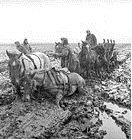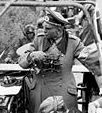Rasputitsa
Posts: 2903
Joined: 6/30/2001
From: Bedfordshire UK
Status: offline

|
quote:
ORIGINAL: Wild
Jomni, that's a very good point. Changing things too much away from history, would probably increase things that some player's would find gamey. Thus increase arguing and the need for more house rules.
Farfarer, I agree. The fun is in achieving things that are non historical. Such potentially capturing Moscow, avoiding Stalingrad, ect.
However i am not arguing against non historical results. Rather, i'm arguing that they be achieved in an historical fashion, with the production, doctrine and overall situation that was in the real war.
What excites me about this game is trying to do better then my historical counterparts did with the same tools and situation that they had.
Of course i realize that this is only a game and cannot replicate things with the accuracy that i would like. But it's the closest thing i have found so far.
I cannot express my enthrallment enough with WitE. When i read Glantz and then play a few turns, the eastern front seems to really come alive for me.
That is why i would like to see the game stay as close to history as possible.
I guess i was just wondering if other players felt the same way, or see it as more of a grand strategy game.
Thanks for the input guys.
The problem is the definition of replaying, or staying close to, history. I want to have forces that have the same capabilities of the historical forces, recognising that these capabilities changed over the course of the war. I don't neccesarily want to replay history - I don't want crowd my best mobile forces into a city, have them fight room to room, whilst leaving my weakest forces to hold the flanks. I don't want to plan an obvious attack, then delay for months so that the enemy can build extensive fortifications. I don't want to leave prepared border fortifications to move into a dangerous salient, in Poland, and then delay full mobilsiation until too late.
I would like the option to do both, play against an historical enemy, who uses the historical doctrine, but also have a shot at the alternatives.
Hind-sight can be a powerful tool, we know from history what did not work in the campaign, but we can never know what would have happened if Moscow had fallen, or if the Germans had evacuated Stalingrad in good time, etc.. Many options do not need hind-sight, there were alternative plans for Barbarossa, which were formed before 22nd July 1941, therefore, without hindsight and I would like to try them (an alternative 'OKH Barbarossa' plan is already available as a user designed mod, with more to come). There were many alternative strategies and doctrines proposed during the war, on both sides, and it would add a lot to the game to have them available.
What would have happened if the Germans had stopped offensive operations sooner in 1941 and put supply priority into winter clothing and equipment, difficult to judge because it didn't happen, but do the first winter effects always have to be so severe. How would it have worked out if Stalin had not purged the Red Army in 1937 - improved morale, better command and control, or if Tukhachevsky reforms and armoured doctrine had not been abandoned.
I don't think anybody wants a game than runs on tramlines and can never change direction, it is the 'what ifs' that could provide the most interesting aspects of the game.
This is a win win situatation, making alternatves available does not stop other settings and scenarios being available, to play an entirely historical game, with the same limitations suffered by the historical commanders, which is an essential baseline on which to build any alternatives. 
_____________________________
"In politics stupidity is not a handicap" - Napoleon
“A people which is able to say everything becomes able to do everything” - Napoleon
“Among those who dislike oppression are many who like to oppress" - Napoleon
|
 Printable Version
Printable Version


















 New Messages
New Messages No New Messages
No New Messages Hot Topic w/ New Messages
Hot Topic w/ New Messages Hot Topic w/o New Messages
Hot Topic w/o New Messages Locked w/ New Messages
Locked w/ New Messages Locked w/o New Messages
Locked w/o New Messages Post New Thread
Post New Thread